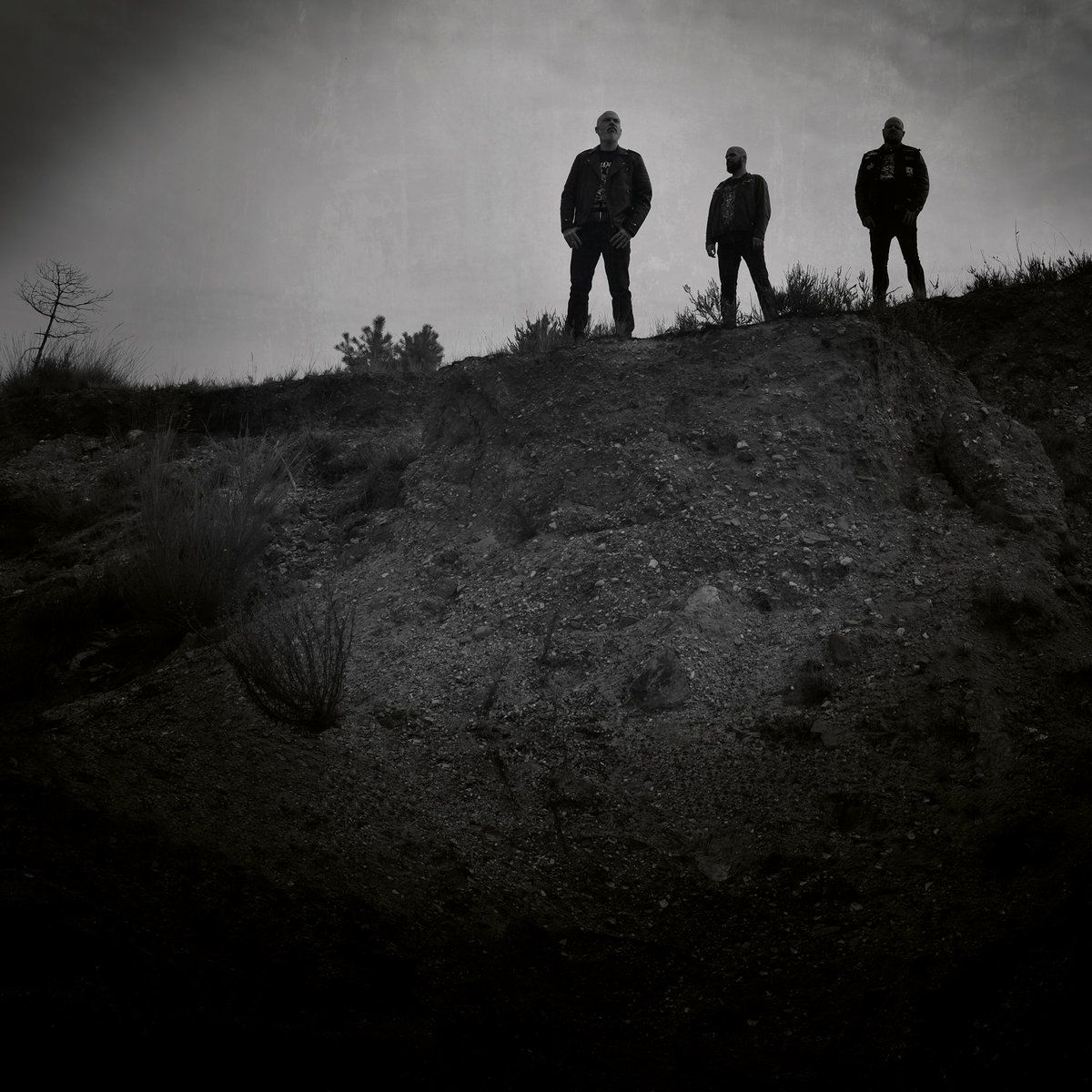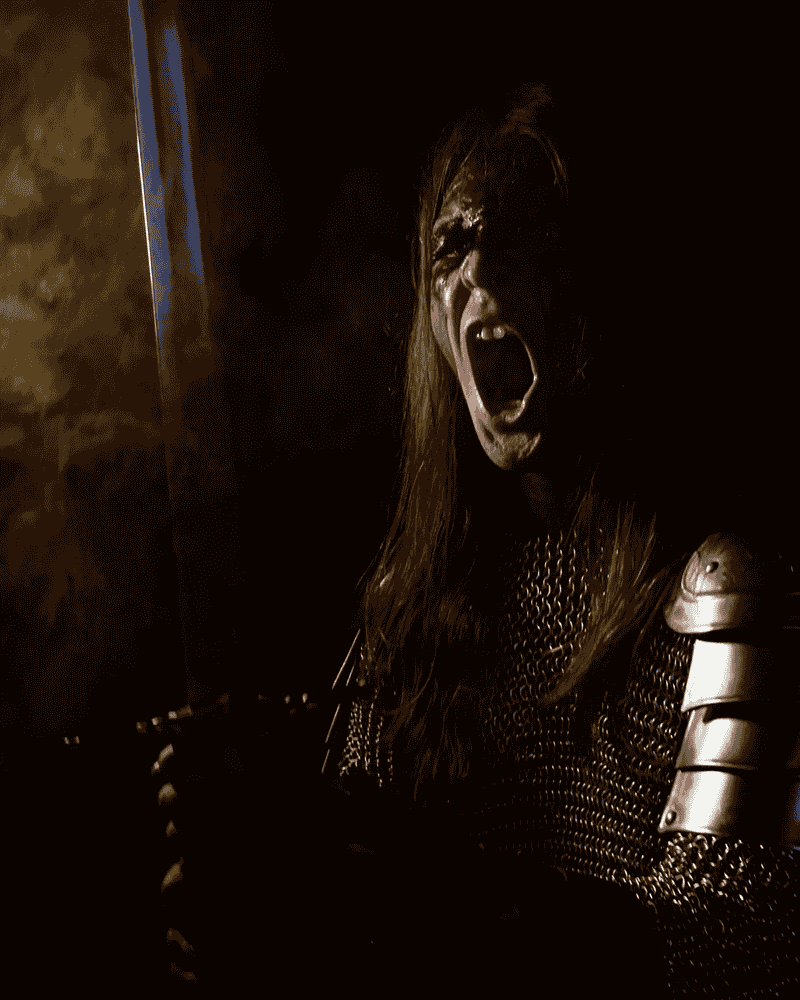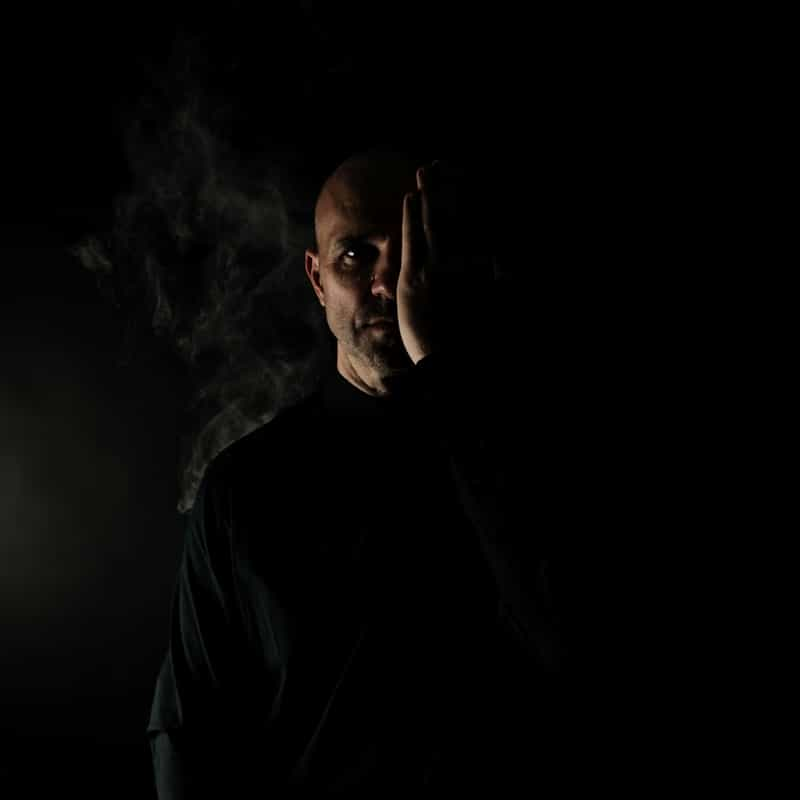Rituals of the Dead Hand Interview

Rituals of the Dead Hand is an Extreme Metal band from Flanders, Belgium. Combining elements of Black and Doom Metal, to create a sound that is uniquely dark and oppressive and extremely atmospheric, the band recently released their excellent second album “With Hoof & Horn” (read our review here) on Dunkelheit Produktionen. As always, when I hear great music I want to talk to the people who made it. Band members Beleth and Isangrim kindly took the time to answer some questions. Read on to learn more about the band, their music and their influences…
Thanks for agreeing to this interview for Blessed Altar Zine. First of all who is Rituals of the Dead Hand and what does each member contribute to the band?
Beleth: It is our pleasure, and thanks for showing interest in the band. First off, Rituals of the Dead was formed in 2016, by Lykaios (vocals, guitar, keyboards) and Isangrim (drums and live samples). Both of them are currently also part of the Belgian post-metal band Hemelbestormer, and some previous bands include Gorath and Serpentcult. I myself (Beleth, bass and live backing vocals) became a full Rituals member in 2019.
As veterans in the Belgian metal scene, we have known each other for quite some time. Lykaios and me also played in the doom/sludge band Horus, but that is almost 10 years ago. And In 2018, I was asked to fill in on bass, during a European mini-tour of Hemelbestormer, which was lots of fun to do. So yeah, we know each other quite well and being a no-nonsense three-piece combo, we focus on having pleasure in playing together, and as heavy as it comes.
Lykaiois writes the music. Period. It’s as simple as that. First, He composes and records the songs in pre-production at home. Demo’s, if you will. Both Isangrim and me are in charge of the lyrics. During the recording process, I also worked on the artwork of the latest album. And after a while, it all just comes together, quite smoothly.
The new album “With Hoof and Horn” continues to explore the dark mythologies of the band’s first album “Blood Oath”. Can you tell us a bit about the ‘Buckriders’, and how this history and mythology has shaped the band?
Isangrim : First and for all, when we started out, we were looking for lyrical themes and a very important factor was that it had to be something very close to our own heritage and culture. It makes music more genuine, more authentic. We are a band from Flanders, Belgium, the province of Limburg to be precise, so why would we explore Norse Mythology or something when there are so many dark, historical and folkloristic tales so close to us? The “Buckriders”, or “Bokkenrijders” in our native tongue, were a gang of brutal robbers who sold their souls to the devil and flew through the sky on the backs of flying billy goats. They terrorized god fearing Christians throughout the borderlands of (what is now) Belgium, The Netherlands and Germany, pillaging, burning and wreaking havoc everywhere they came. Perfect setting for death- and black metal, if you ask me. For our lyrics we focus mainly on this folkloristic aspect, because the historical Buckriders were far more spectacular. Or at least their deeds were. Throughout the 18th century, there were indeed several criminal gangs in these parts, but their crimes were far less impressive than these of the myths and they never called themselves Buckriders (with a few exceptions). However, the Church and government wanted to make an example out of these people and trialed and executed them for far worse crimes. The whole thing was blown out of proportion, really. But still, these things, the trials and executions, happened just a few miles from where we live, which makes them very real and almost tangible.
There’s a definite Black Metal feel to the new album, but there seem to be other strong elements like Doom in the mix too. I’m reminded of Celtic Frost, who always played with dark themes and atmospheres, but never seemed to fit neatly into any genre. Who would you say have been the biggest musical influences on the new album?
Isangrim: I don’t think Celtic Frost was a specific influence while writing the music, but in the end, almost every death- and/or black metal band is indebted to them in some way. Their approach towards songwriting, their nearly pitch black atmosphere and overall heaviness are truly unique and therefore I take this as a huge compliment! As for other influences, I think Urfaust, The Ruins Of Beverast and old era Samael should definitely get a mention. All bands where atmosphere and an unsettling feeling are very present.
Some bands push the extremes by playing as fast as they can; others create more heaviness by playing slower. I often find the slower heaviness more satisfying. What attracted the band to taking this slow and heavy approach?
Isangrim: Well, like mentioned before, atmosphere is very important to us, and in a way , slower music tends to be somewhat more atmospheric and eerie. It’s like creating this ultra heavy veil of darkness that suffocates and disorients you. Like a constantly lurking danger in the shadows that just from which you never know when it will strike. It’s genuinely unsettling. We also have some faster parts to symbolize the rage and fury that the riders used on their raids, but since they were more of a mysterious and hidden entity, the focus is mainly on the slower, more brooding parts.

You have some lyrics in English while others are in Dutch (I think). I’m not sure if you have any lyrics in other languages too. What are your reasons for choosing to write in one language or another? Do you feel like it helps to tell the stories in different ways or is it more about how the words sound?
Beleth: Well, you nailed it. English is, to a certain degree, the lingua franca of heavy metal, regardless of the cultural background. Writing partly in Dutch (or Flemish, if you will) contributes to the fact that we try to add something extra to the songs as a whole. You see, the legends and myths of the buckrider-cult is a part of our cultural and historical heritage., thus contributing to the relevance of local history. Second, by writing parts of the lyrics in our native tongue, they add to the emotional power of the music, with Lykaios’ vocal functioning as much as an instrument as a vessel for words. You see, I don’t speak Icelandic, Ukrainian nor Norwegian, but the music by bands such as Sigur Ros, Solstafir, Drudkh or Satyricon appeal to me nevertheless. Even without understanding a single word. And third, it just sounds fucking cool.
What is the relationship between Hemelbestormer and Rituals of the Dead Hand?
Isangrim: I think Beleth answered this one already. Both Lykaios and myself are part of Hemelbestormer and Beleth is a close friend of the band who even helped us out on a tour at some point. Lykaios and I started Rituals Of The Dead Hand to express our love for death-, doom- and black metal (and extreme music in general), but it was originally intended as a studio project. However, the results were so satisfactory that we decided to take it to the stage anyway. This is where Beleth came into the picture again as he was our first and only choice to pick up the bass for this purpose.

With such a rich mythology as a basis for the band’s songs, it would seem like perfect material to have visuals with it. I could imagine your songs having some kind of Cormac McCarthy world on the screen, maybe following the story of the ‘Buckriders’. Have you thought about creating some videos to go along with the songs, or maybe even a short movie alongside the latest album?
Beleth: For sure! I had a screenplay ready, a shitload of ideas in my head, locations were found,… Two students of the art academy where I teach agreed on filming the whole thing. I even had props prepared we could set on fire, haha. The filming was planned for November 2020, but the Covid restrictions made sure our plans got fucked. We’re not quite sure on how we’ll go from here but the urge to support our music with some moving images is very much alive. We’ll see how things turn out.
I can’t bring to mind many Belgian bands playing Extreme Metal. Do you have some other like minded bands in your orbit that you feel like you’re in a musical community with?
Isangrim: Actually there are plenty of bands that deliver the goods here and although we are not a big community of brothers that constantly hangs out with each other, there is a lot of mutual respect. There’s Alkerdeel, good friends of ours who play the rawest, grittiest and heaviest sludge/black you can imagine. Wolvennest is starting to become internationally acclaimed and they deserve every bit of it. Their dark, ritualistic and transcendent art is mandatory for every adept of extreme music. Serpents Oath is a rather new black metal outfit consisting of several veterans from the scene and their album “Nihil” is certainly a recommendation. There are of course a lot more, but this answer would become very lengthy if I have to mention them all.

The pandemic situation of the past year has really messed up every band’s plans for performing live, but I know you had some opportunity to perform live before all the restrictions came in. How have your experiences been playing live together so far and what are your hopes for playing live together in the future?
Beleth: Well, all three of us have families, with small kids, and are also active in other bands and projects, so it is not always that simple to a lot of live shows. Plus, we’re quite selective on where we perform. Quality over quantity, you know? We did some very cool shows in Belgium and Germany so far, and we just have a lot of fun performing live. Lykaios is the organiser, Isangrim is the calm one and I am the nervous one, and we all have a very particular sense of humor. All those things combined make it a lot of fun for us to perform together. No drama. No bullshit. What the future brings us is as of yet still unclear, but we really hope to be able to hit the stages again in the fall of 2021, depending on the Covid restrictions and side projects, ofcourse.
Aside from the themes and influences you’ve mentioned so far, are there any other sources that have inspired the band (whether it’s literature or history or philosophy or whatever)?
Beleth: Personally, I find creative solace in art, music, movies and history. It can range from the entire Sisters of Mercy back catalogue to a painting by Caravaggio, from a book about the Burgundians to the song ‘Exercises in Futility V’ by MGLA. It’s very eclectic, to say the least. Consequently, my bass playing and artwork is influenced as such, in one way or another. A synthesis of all the things I have an interest in, you know?
Isangrim: Besides music, I tend to read a lot. Novels, historical works, scientific articles,… everything that is informative and critical enough to expand your view on the world, humanity and the complex relation between both.
Finally is there anything else you’d like to promote or mention for our readers?
Beleth: Personally, I am thankful that people take an interest in our music. It means a lot. So, thank you, guys!
Isangrim: Likewise! Also, keep your eyes peeled for new releases from Hemelbestormer and Lhaäd, another project of Lykaios. Both will be released in the autumn of this year and both will blow your mind.
Interview by Tom Boatman
Thanks again to the guys for their time. “With Hoof & Horn” is out now on Dunkelheit Produktionen. Follow the links below to buy a copy and follow the band on social media to stay up to date with all upcoming news and releases.
Label
Bandcamp
Facebook
Instagram
Shop
Soundcloud
Twitter
Website
YouTube
**Please support the underground! It’s vital to the future of our genre**
#WeAreBlessedAltarZine
#TheZineSupportingTheUnderground


